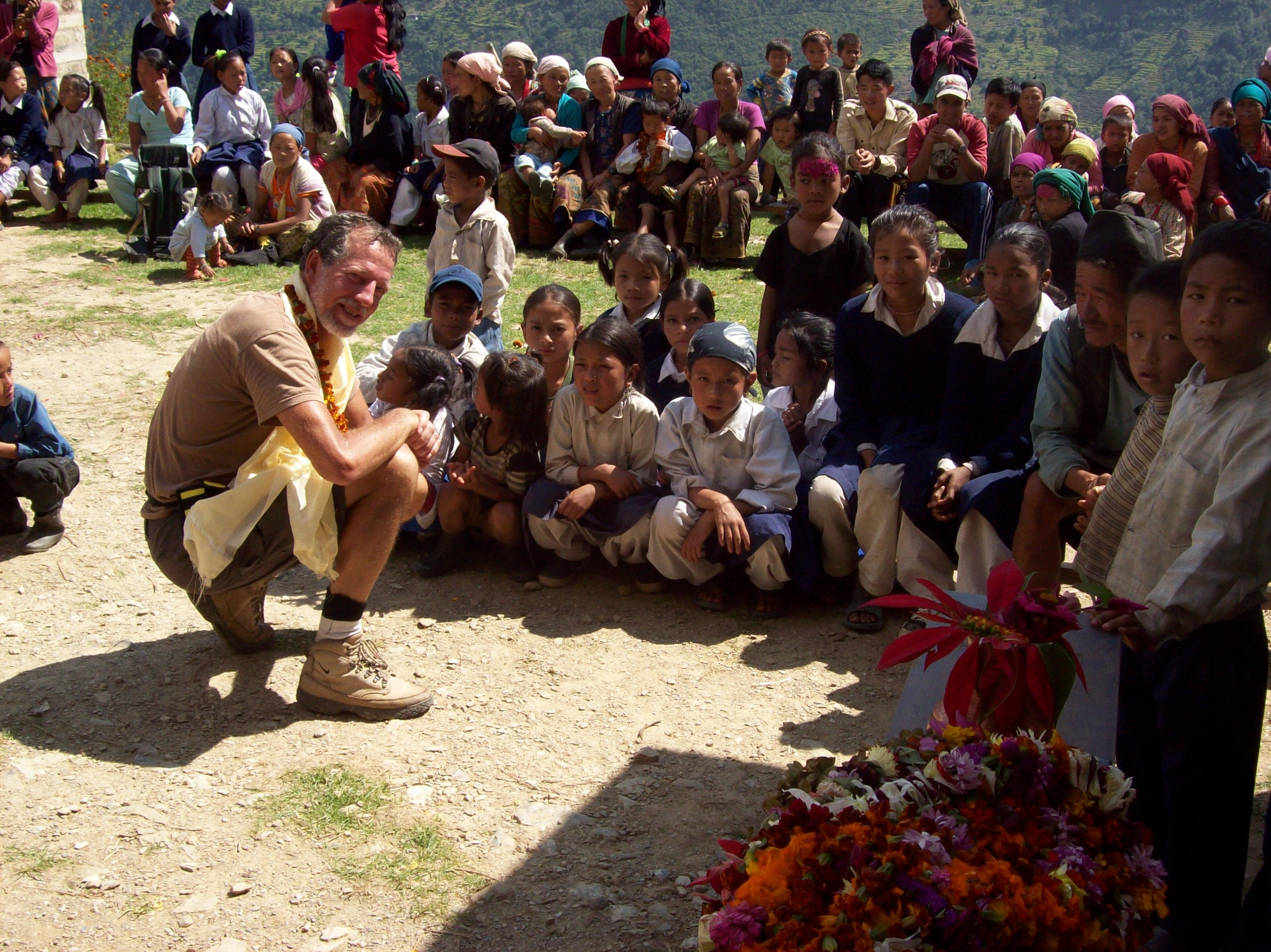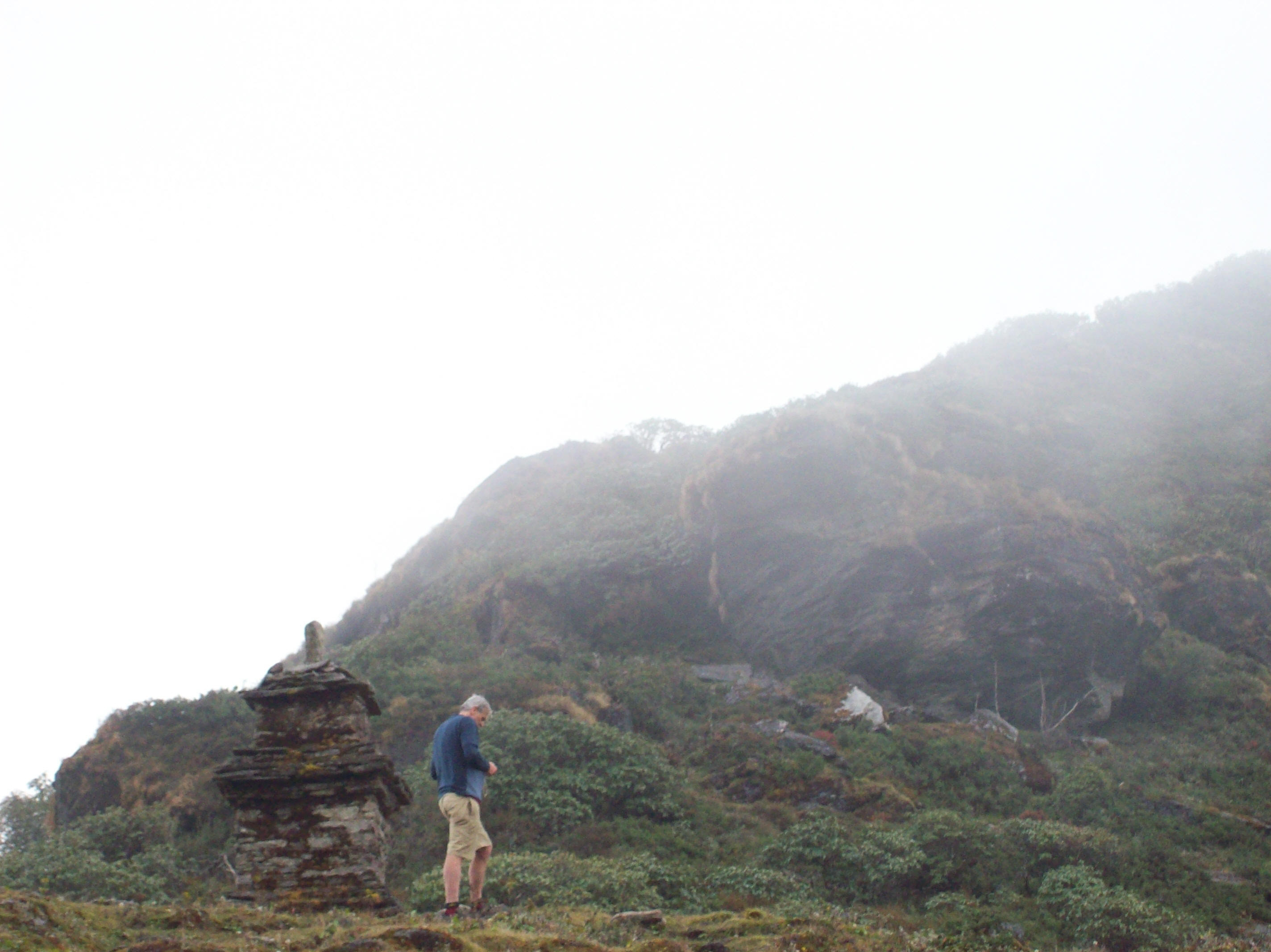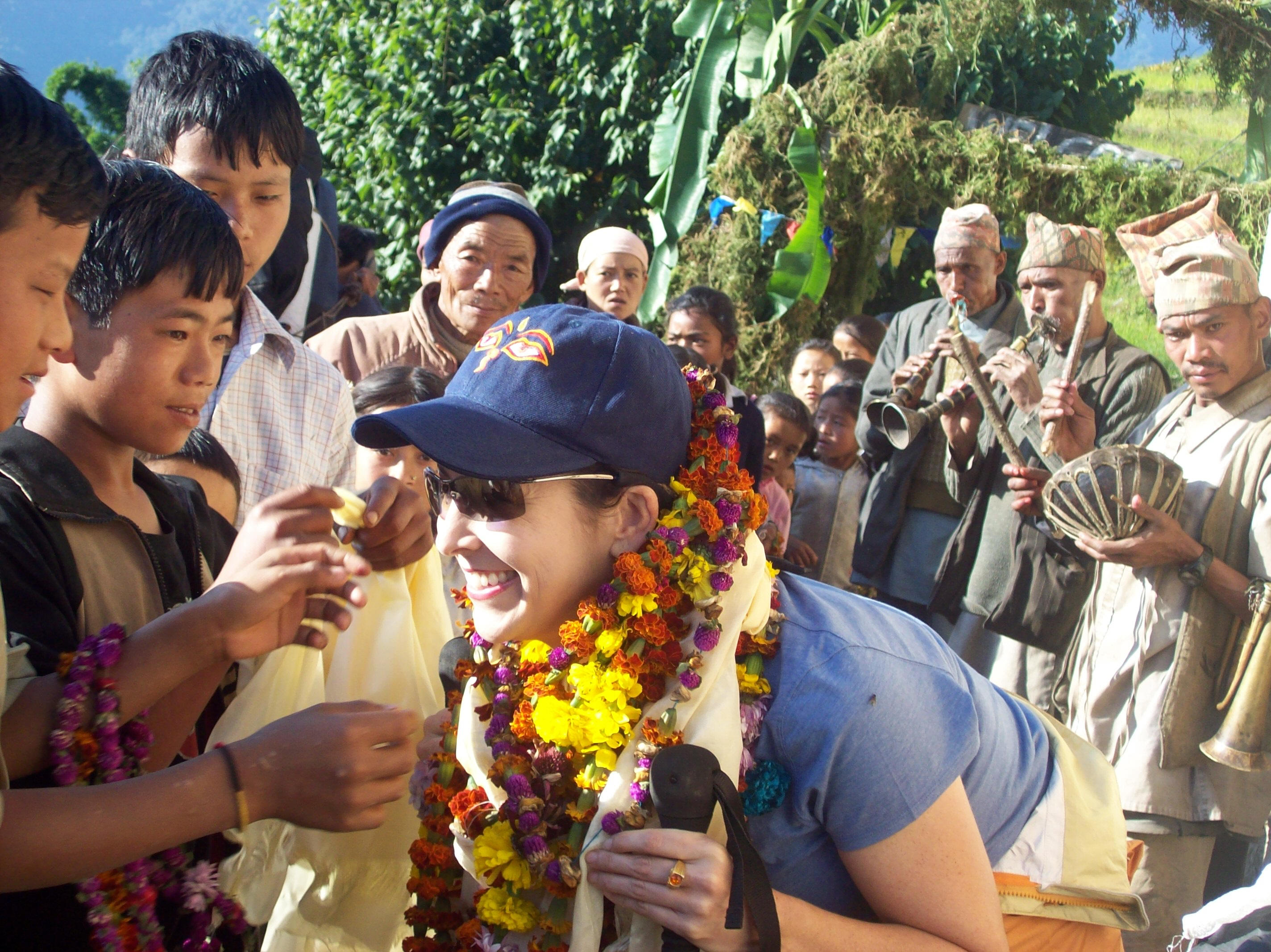First there were ten. Our
two teachers dropped out, because their grant application was not approved.
Then, our M.D. was in an auto accident. Another member was unable to
do the trek for personal reasons. So, we were six. But only 3 of
the 6 made it to Basa Village in the remote region of Solu in eastern Nepal.
The day we were to fly from
Katmandu to Paphlu airstrip, weather prevented the flight. The next
day a plane crashed in the mountains and all domestic flights to eastern
Nepal were cancelled. A decision had to be made, and our group agreed
with our sirdar (head guide) Sangha that we should take a bus as far east as
roads allowed, to Jiri. Then we would hike to Basa and back to the
airstrip in Paphlu. This change of plan, however, transmogrified our
planned introductory village-culture trek from a leisurely walk-about to a
death march (a bit of an exaggeration). We had to do 8-12 hour
hikes for 6 days to reach Basa Village in order to make up the time lost.
It took us two days to hike from Jiri to Paphlu, which was where the trek
was supposed to start.
One of our members realized the
first day that the was not sufficiently conditioned to maintain the pace.
He was slightly hypothermic that night, and so had a rough time on and off
the trail. One of our porters was assigned to him, and the two of them
hiked at a leisurely pace to Paphlu. Another member pulled a muscle
the second day, and hiked for two more days in excruciating pain, but was
forced to give up when he reached Paphlu. A third member graciously
decided he would look after the other two at Paphlu, and the three of them
flew back to Katmandu the day before the other three of us made it back to
Paphlu on our return from Basa.
The three of us who made it to
Basa had an extraordinary experience. We were only the third group of
"white people" who have visited the village in living memory. Canadians
helped to build a school in the village ten years ago. A French group
helped to add a second building to the school last year. These are the
only other Westerners the villagers have seen. Basa is in a remote
valley in an area of Nepal not visited by tourists, trekkers or climbers.
We were greeted outside the
village by elders playing homemade instruments, who led us down into the
village. A welcome arch twined with flowers was at the edge of the
village. All of the villagers awaited us with flower garlands,
which they placed around our necks in such quantity we could barely see
over the leighs. The elders gave welcoming speeches and thanked us
profusely for $1400 friends of mine have donated to the school's fund.
(I have promised to raise $5000 total for the school. See below.)
After the welcoming ceremonies, we visited several homes where we were
given much more rakshi (home-distilled liquor, the traditional drink
offered to guests). It tasted good, and getting high in the
Himalayas on rakshi after 6 days of challenging hiking was just what we
needed. That evening, the children performed traditional dances
for us.
Before we left the next
morning, the whole village turned out again to see us off.
Speeches were made, rakshi passed around, and flower garlands piled on
us. Children held our hands as we hiked up the trail leaving town,
and women kissed our cheeks and wept. The little band tootled and
thumped their instruments as they led us up the trail above the
village.
Back in Katmandu, I was able
to meet with Niru Rai and Uttam Phuyall, my friends in Katmandu who
oversee the account for the School Project funds. We worked out
a budget for the remaining funds to be raised. It is agreed the
4th and 5th grade teacher salaries will be paid for 3 years, the old
school building's interior and window frames will be painted, the broken
floor patched, a playground and safety wall built, new student benches
built, and workbook materials provided for the students.
The village has no electricity, heat or piped-running water.
There are no vehicles, machines, or anything that uses wheels. The
people of Basa live pretty much the same way their ancestors lived 500
years ago. The school building's windows do not have glass, and the
students sit on wooden benches with no desks or worktables. The
teachers, who are village women, have no materials, except a
chalkboard. The playground is a hard dirt-patch. But the
children, like so many in remote Nepal villages, are curious and want to
learn. While the villagers have little material wealth, they have
a deep appreciation of hospitality and beauty. Every family has a
flower garden, and each family member made two flower garlands for each
of us.
BASA SCHOOL
PROJECT
If any of you have questions
about the School Project and would like to donate to it. Please
let me know.
Donation checks should be made out to: "Rasley & Wood,
P.A. Trust Account", and mailed/delivered to:
Jeffrey S. Rasley
Rasley & Wood, P.A.
47 S. Pennsylvania St.
Ste. 200
Indianapolis, IN 46204
The donations will then be
sent to the La Campagne Ministries, Inc. account, and then transferred
to the School's account in Katmandu. You will be able to claim a
charitable deduction on U.S. taxes to La Campagne Ministries, which is a
501(C)(3) organization certified with the IRS. My friend Brad
Bloom is president of the organization, and generously agreed to have
the Ministry sponsor the School Project for tax purposes. (You can
access the ministry's publications at Lifestyle Media Group's website
for MAP and Faith & Fitness Magazines,
http://www.maplifestyle.com/.)
Date: Thu, 4 Dec 2008 15:35:03
-0500
Subject: Basa School Project: We did it!
To: Donors
I mailed a check to the La Campagne Ministry account today in the amount
of $3,170.00. Separate donations have been sent either to the Ministry's
account or to the School's account in Nepal in the amounts of $1,000.00
(Bob-CICF), $445.00 (Mika), $185.00 (Dave's ticket refund to Niru),
$1375.00 (check I delivered in Oct). A total of $6,300.00 was raised for
the School Project, and over $6,100.00 will be used for the benefit of
the School after bank fees are paid and La Campagne charges 2% for its
administrative services.
The school will be able to complete the renovations planned, build a
playground & wall, and pay two teachers' salaries for three years, per
the $5000.00 budget plan. In addition, a compost toilet will be
installed for the School and Village at an estimated cost of $500.00.
Niru, Uttam and I will be discussing what additional things we can do
for the School with the amount raised over the goal. For example, we
have not yet shipped the educational materials John obtained from the IN
Dept. of Ed, so we may hold some amount to cover those costs. I will let
you know what else is done with the monies raised.




